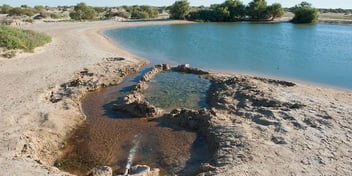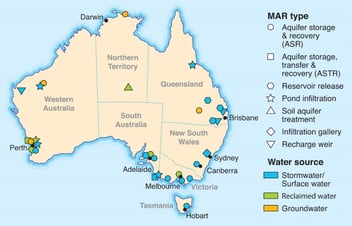Perth introduces new waterwise initiatives
The city has launched a revised managed aquifer recharge policy and groundwater allocation plan to combat the increasing effects of climate change.
The two new initiatives, delivered as part of the Waterwise Perth Action Plan, seek to transition the city to a leading smart water city by 2030.
The revised managed aquifer recharge (MAR) and Cockburn groundwater allocation plan will help to achieve two key targets of Perth's waterwise action plan.
First, the city is targeting reducing groundwater use by 10% across the Perth and Peel region by the year 2030. It also seeks to ensure recycled and alternative water supplies make up 45% of the projected gap between future water demand and water supply.
Western Australia used to get 420 billion litres of water running into its dams each year, but with climate change significantly reducing rainfall since the mid-1970s, it can now expect only 25 billion litres.
The plan to help secure the city’s water future aims to reduce water use to 110 KL per person per year.
How it will work
Managed aquifer recharge, also known as water banking, sees the injection or infiltration of water into an aquifer. Treated wastewater is further treated to drinking water standards and put back in aquifers. The stored water will be available for use in dry years when surface water supplies may be low.
The revised MAR policy and guidelines provide a management framework for aquifer recharge operations in Western Australia. The guidelines also support investigating whether aquifer recharge is a viable and cost-effective solution to meet their water demands.
Perth is home to Australia’s first full-scale groundwater replenishment scheme, which started recharging recycled water to the city’s deep aquifers in 2017.
The Cockburn groundwater allocation plan sets out how the Department of Water and Environmental Regulation will manage and allocate the groundwater resources in the Cockburn groundwater area.
It will support the growth and productivity of industry in Cockburn and Kwinana, and maintain the health of local wetlands and urban landscapes is central to the plan.
Under this new plan, local groundwater users are encouraged to become more waterwise, with a range of management strategies and additional protections for this valuable groundwater resource also introduced in response to the impacts of climate change.
The new plan provides a framework for the sustainable use of groundwater for parks and gardens, irrigated agriculture and industry in the Western Trade Coast industrial area, which restricts new sensitive land uses within the zone. It also protects groundwater-dependent ecosystems such as wetlands, lakes and urban trees across the area.
Western Australia’s water minister Dave Kelly highlighted the increasing effects of climate change on announcing the plan.
“The new water allocation plan sets out how we can respond to the impacts of climate change and better manage valuable groundwater resources in the Cockburn groundwater area — while supporting local industry and protecting the local environment and amenity,” he said.
“Recharging our aquifers helps optimise the use of our valuable water resources, and will serve as an important supplement to our finite groundwater resources which are being impacted by climate change.”


